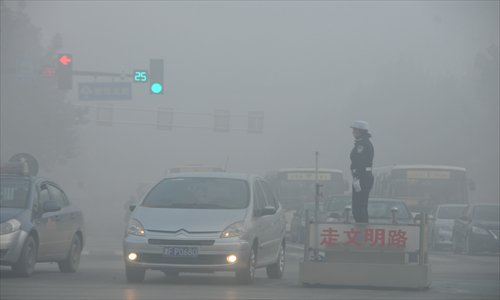Air despair

A policewoman stands in the middle of a smoggy street in Shijiazhuang, North China's Hebei Province on November 3. Photo: IC
With dense smog returning to the skies of Beijing recently, questions are being asked again about the problem of pollution, its source, and how to deal with it.
One of the main sources of "fog" in the capital is the steel sector of North China's Hebei Province, a local pillar industry, according to a report Tuesday by China Youth Daily.
An inspection team with the Ministry of Environmental Protection witnessed how steel companies pollute the air in Shijiazhuang, capital city of Hebei, according to China Youth Daily, one of whose reporters covered the inspection.
Many of the steel companies in the province have not registered with the Ministry of Environmental Protection, the report said, and even those that have registered sometimes do not use their desulfurization equipment in order to cut costs.
Beijing is surrounded by the province. Of the 10 most polluted cities in China, seven are located in Hebei Province, according to media reports in September.
Relentless production
An inspection in March by the North China inspection center under the Ministry of Environmental Protection found that most steel plants that have come into service in North China since 2005 have no official certificates. In Hebei, 80 percent of them have no certificates.
Because of a growing problem of overcapacity in the steel sector, approval of new steel plants was stopped in 2005 by the central government.
Nonetheless, steel production increased from 300 million tons in 2005 to about 800 million tons in 2013. And production in Hebei increased from over 100 million tons in 2005 to 314 million tons this year, according to media reports.
Hebei Jingye Steel and Iron Limited Company, based in Pingshan county near Shijiazhuang, was investigated by the inspection center in late November.
The company was given a warning by the ministry in 2008 because it had not gone through the necessary environmental evaluation. The company built facilities including two new furnaces in October 2010 without any environmental evaluation, according to China Youth Daily.
Jingye company ranked top in steel production in 2011 compared with other companies in Shijiazhuang by producing 10 million tons of steel.
"Hebei is facing a more serious situation with air pollution compared with Beijing and Tianjin. In the first eight months this year, people all over Hebei could only breathe fresh air one-third of the time," Zhou Benshun, Party secretary of Hebei, said at a meeting about air pollution prevention on September 27, according to a report Tuesday by China Economic Weekly.
Profit motive
Xiong Yuehui, an official with the Ministry of Environmental Protection, told China Youth Daily that steel companies are more concerned about profits than reducing their environmental impact.
"Many enterprises value profits without caring about air pollution, and local leaders don't supervise them rigorously so long as GDP is satisfactory," Zhong Dajun, director of the Beijing Dajun Institute for Economic Observation, told the Global Times Wednesday.
Measures to curb air pollution should have been taken a long time ago, but this is the country's reality, he said.
Discharge of pollutants should be closely watched and rigorously controlled around Beijing given that it is so densely populated, said Zhong.
In Xinji city in Hebei Province, which also fell within the scope of the ministry's inspection team, three plants owned by Xinji Aosen Steel Co have been the subject of numerous complaints from local people, according to the report.
However, some villagers in Nanzhiqiu town in Xinji have mixed feelings about the plants. They can get jobs at the company, but they have to live with the polluted air it creates.
According to the China Youth Daily report, production of 10 million tons of steel involves the discharge of 10,000 tons of dust and 29,000 tons of sulfur dioxide, even at plants that have properly functioning environmental facilities.
But in reality, some companies don't operate their desulfurization equipment in order to save money.
The cost of operating desulfurization equipment accounts for around one-sixth of the company's revenue, so a steel company could make an extra 50,000 yuan a day by not operating the equipment, Xiong told China Youth Daily.
Xinhua reported Wednesday that 104 Chinese cities suffered from smog in early December, and the number of pollution-affected days this year has been the most in the last 52 years.
Foggy weather has become a national problem, found not only near Beijing, but also in the Yangtze River Delta region and the Pearl River Delta region.
Action plan
Hebei Province is making efforts to curb air pollution and reduce steel production. For instance, some steel plants have been closed in Tangshan.
The provincial authorities also announced broad new measures to curb pollution on September 12, according to media reports.
The measures include setting quotas for air pollution, and a real-time digital monitoring system will be set up to supervise enterprises, most of which are in four highly polluting industries: iron and steel, glass, cement and power generation.
The four industries discharge about 80 percent of the total emissions in Hebei, Yang Chongyong, deputy governor of Hebei Province, said last month. Anti-pollution monitoring equipment will also be installed in major steel plants to keep emissions supervised, Yang noted.
The new measures also include a plan to reduce steel production in the province by 60 million tons by 2017, but experts still don't think this will be enough to improve air quality.
Too many steel companies haven't gone through any environmental evaluation process, and they should be ordered to cease production too, experts said.
Enterprises with old or obsolete facilities should be shut down, and those that maintain production should upgrade their facilities and should be closely supervised by the local authorities, Sheng Yi, a researcher with Sichuan Academy of Social Sciences, told the Global Times Wednesday.
"Only rigorous supervision and punishment can stop steel companies from polluting the air," said Sheng.